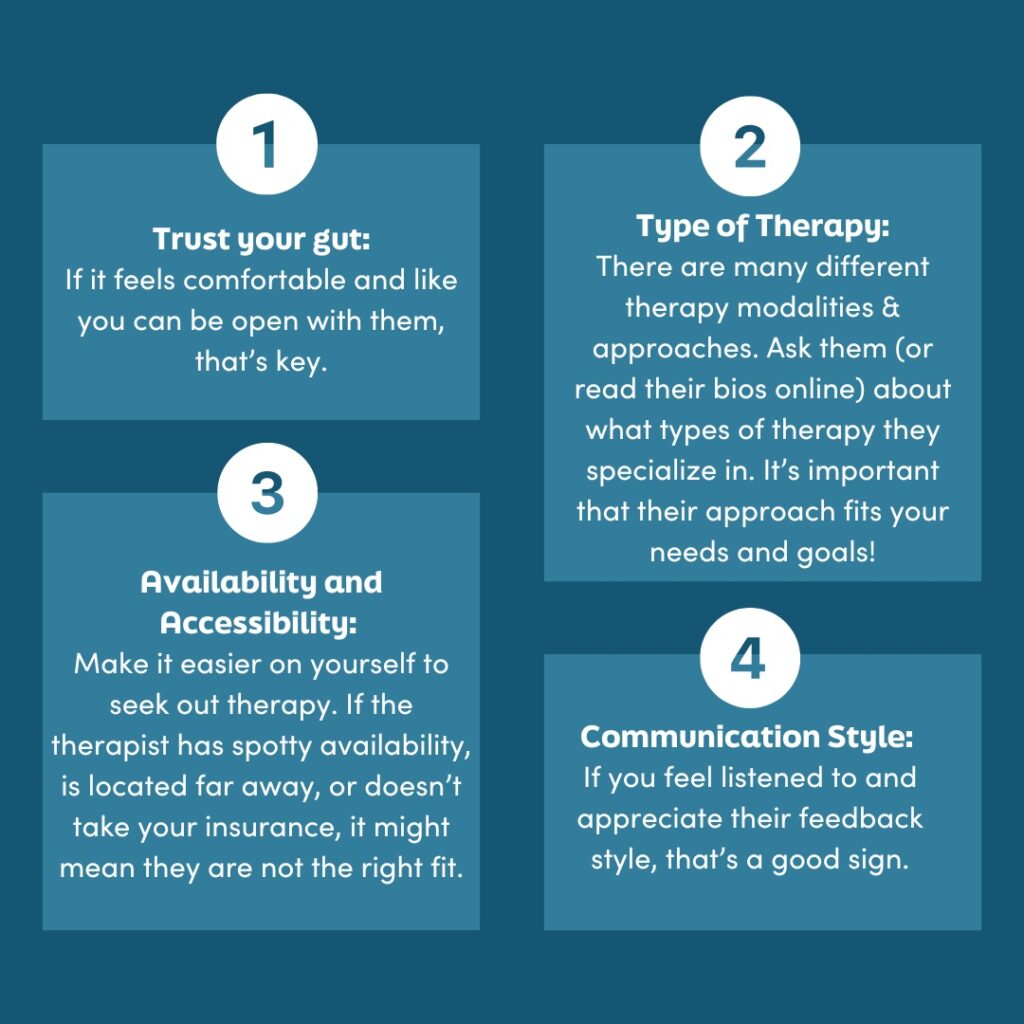As someone who explored therapy as a client before I became a therapist, my assumptions of what my personal therapy would look like did NOT align with my actual experience. Now that I am a therapist and have a year of personal therapy under my belt, here are some guides and expectations of what you can anticipate for your therapy session.
How to Find a Therapist
First and foremost, the not-so-exciting part: Finding a therapist. It can be difficult finding a therapist that takes your insurance. When looking for a therapist, I personally used PsychologyToday.com which is a great resource to find demographics that you enjoy, if they take your insurance, and you may also see a quick blurb of who you are about to spill your guts to!
After reaching out to your preferred match via whatever communication method they prefer, they will most likely reach back out and gather your insurance information and card information if necessary. From there, you will schedule a date and time that works best for the both of you.
Ellie Mental Health makes it easy—our client access team (AKA the people who answer the phones) will ask you questions about what you’re looking for in a therapist, what your symptoms are, etc. and then match you with a therapist in your community that checks all of the boxes.
Ready to begin your therapy journey? Get started below to be matched with the right therapist for your unique needs.
How to Know if Your Therapist is the Right Fit?

Finding a therapist that suits you is like online dating. No, this does NOT mean you’re looking to date a therapist. What this DOES mean is that sometimes you may think by reading someone’s profile that what they offer is exactly what you want, however, the moment you meet them you might not feel like they’re the right fit for you. And that’s okay.
Often, people get uncomfortable with the idea of switching from therapist to therapist if they don’t match the vibe check, but that’s a totally natural part of therapy. You are allowed to look for another therapist if you do not feel comfortable. After all, this is YOUR journey and if you do not feel comfortable with the person, therapy isn’t going to be as effective.
How will you know if your therapist is the right fit? Think about what’s important to you. Do you want them to be similar in age, older, or younger? Do you want them to specialize in a certain diagnosis? Here are some things to keep in mind:
- Trust your gut: If it feels comfortable and like you can be open with them, that’s key. It might take a few sessions to feel this out, and that’s ok!
- Type of therapy: There are tons of different therapy modalities and approaches. Ask them (or read their bios online) about what types of therapy they specialize in. it’s important that their approach fits your needs and goals!
- Availability and accessibility: Make it easier on yourself. If the therapist has spotty availability, is located far away, or doesn’t take your insurance, it might mean they are not the right fit.
- Communication style: If you feel listened to and appreciate their feedback, that’s a good sign. Do you want them to laugh at your awkward coping jokes, or do you want them to call you out? It all comes down to communication styles.
Before Therapy: Emotions Heading into the therapy Visit
It’s totally normal to feel nervous as you’re approaching and anticipating that first session. If this is your first time in therapy, there is going to be a lot of things that may come up: the what’s if, what should I say, what should I do, is it okay to cry, what if I don’t…. Please know that these things are expected and your therapist has seen it all.
At the beginning you and your therapist will begin building rapport. They’ll want to learn more about you, what your strengths are, what symptoms you’re experiencing, and what’s important to you. You are also allowed to ask the therapist questions to get to know them and how they approach treatment.
Your first therapy session will be a lot about your background for your therapist to get a glimpse of your presenting problem, the history of that problem and your personal history, your inner circle, etc. Even if some of these topics seem to have nothing to do with what you are coming in for, it may be beneficial for the therapist to hear about your life to analyze what could be leading to your mental health concerns or symptoms. They’ll also give you different assessments to better understand the symptoms that seem to be bothering you, how often you’re experiencing the symptoms, and when they started.
To ease your anxiety of your first therapy session, you could jot down some things either on paper or in your notes tab on your phone some important things from your past. Is there any trauma? Did anything happen in your childhood that is significant? Is there anything that you were already diagnosed with? Even if it seems unrelated, jot it down just in case. You will feel more prepared!
Here are some other questions that you might expect your therapist to ask in your first session:
- Are there any mental health concerns in your family?
- What is your relationship like with your family? Who are other important people in your life? Who is in your support system?
- What are your current stressors? What are you doing to cope with your stressors?
- Have you been the therapy before? What was helpful or not helpful about that experience?
- What are your personal goals? Why did you decide to seek out therapy now?
- How long have you been dealing with these symptoms? How often do you experience these symptoms? Have you noticed any patterns?
Remember that the initial session is an opportunity for both you and your therapist to get to know one another and determine if it’s a good fit therapeutically.
Emotional Journey in Therapy Over Time
Some people do cry in their initial sessions and some people don’t. For those who typically do, it is often a release of things they have kept to themselves for a very long time. For those who don’t, they either do not have that strong of a reaction to their presenting problem or history, or they don’t feel comfortable enough yet to cry in front of their therapist, and that’s okay too! Your therapist doesn’t have a goal of making you cry, and everyone has different emotional reactions to talking about tough stuff.
Another thing to prepare for is even if you end up not having a lot of emotions during your first initial session, you may find yourself exhausted or a little sore after your intake due to your body tensing up. This is because typically people have held onto whatever it may be for so long that the release might be a lot more than anticipated. Try planning your initial intake after school, work, or any major events so that you can go home, rest, and do some self-care.
Misconceptions About Therapy
I remember my first experience with therapy, I thought I had to lie down and just have someone listen to me. Nope! Well… you can, if you want. As a therapist I hear about common misconceptions, and let me set the record straight on several of these:
- Therapy does not have to be a back-and-forth conversation. The therapist will ask questions, but it’s YOUR time to talk.
- You don’t need to lay on the couch while someone diagnoses you. Some of my clients take off their shoes and get comfy. They can lay on the couch, sit on the couch, sit on the floor… I don’t care!
- You don’t have to talk the whole time. There may be some days that you don’t feel like talking, and there are other ways to communicate what’s going on. There are different modalities of therapy, like using mindfulness techniques which may include coloring or playing games. Eye contact can be intimidating during sessions, so clients are ABSOLUTELY OKAY to request anything that may make them comfier.
- Therapy isn’t sad all the time. I don’t know how many times I laugh loudly with a client, and they tell me just to laugh is simply therapeutic.
- Therapy can be celebrating the good things, too. Sometimes people cancel because they feel like they don’t need therapy that week when they may be missing out on an opportunity to celebrate why this week looked different from the rest.
- No one will know about the crazy things you say about your friends but you, your friends, and your therapist. Confidentiality is when your therapist CANNOT repeat anything that is said in the room, unless you plan on hurting yourself (having a plan of suicide), hurting others (threatening someone else), or if you know an elderly adult or child is being abused. Confidentiality can also break if your records get subpoenaed by court and a judge orders the therapist to break confidentiality.
After the Intake
So… What’s next? During ones of your first sessions, you and your therapist will talk about goals you’re like to be working on in therapy. Some common goals might be decreasing anxiety, improving coping skills, etc.
A question I like to ask my clients is “Where do you see yourself in a year, maybe two, maybe five?” Do you want these presenting problems to be there? If not, how do you make that change?
Some other goal setting questions might be:
- How would you like to feel differently?
- What areas of life do you feel are more important to focus on right now?
- What obstacles do you anticipate encountering as you work towards these goals?
- What specific changes would you like to see in your life?
You can do 30, 45, or 60-minute sessions with your therapist and sessions can be weekly, biweekly, every three weeks, or every month with your therapist.
Overall, therapy is a flexible, safe place that is what YOU make out of it, not what society or the internet says. Find a therapist that aligns with what you desire and get matched with one today!
Ready to begin your therapy journey? Get started below to be matched with the right therapist for your unique needs.


